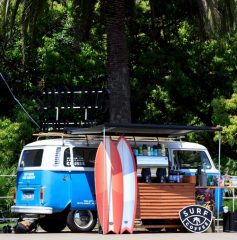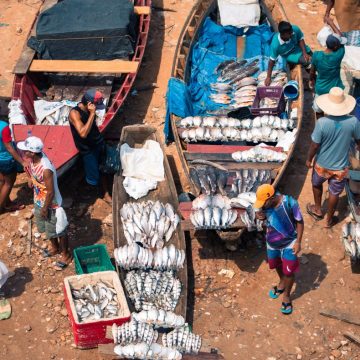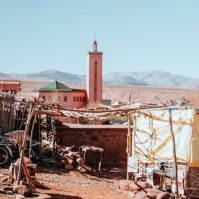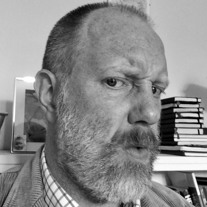


John Herbert teaches and writes in Brighton. He was Highly Commended for the 2017 Brighton Prize and will appear in the Brighton Prize anthology this year. In 2018 his work has also appeared in DNA Magazine and The Forge Literary Magazine and is due to appear in the first print edition of The Nottingham Review in April. He has a PhD in modernist fiction and graduated from New Writing South’s Creative Writing Programme. When not scowling at cameras, he is writing a novel about surfing, travel and belonging from which this story is adapted. He tweets @jherbertwriter

A Point to it All
John Herbert
Morocco, 2002
The wave they discovered was a fickle gem. There had been little hope of it when they had sat shivering in the van that morning on a vast expanse of beach, parked beneath the lee of the sandstone cliffs. It was the end of the road, La Source, the locals had called the beach, the place where the waves began and ended.
‘Les vagues sont grandes,’ the cafe owner at the final village before the mountains had assured them in the mixture of accented English and French that he, like all the locals, spoke to the tourists. They had sipped coffee and listened. ‘Always les vagues, there,’ he had said.
There were waves alright, great frothing lines of them, humping and closing out in percussive tirades along the beach. The odd one spat as it barrelled briefly before slamming the door on any chance of riding it. They had struggled to get the van door open against the insistent press of the wind and stood huddled in coats and hats, watching for a few moments before retreating to the van.
Danny jumped at the sight of one frothing monster, pressing himself closer to the dashboard.
‘You see that?’ he said, pointing at where it had broken. ‘Like Hawaii that was. I reckon this’ll blow over in a minute.’
‘You’re deluded,’ Sean told him and, as if to affirm the matter, another gust swept over the beach, whipping the windscreen with a lash of sand and rain.
‘Miserable Irish sod,’ Danny said. But Sean was right. ‘It’s blue over there.’ Danny pointed past Sean, sat at the wheel, to the extreme edge of the coast. The beach gave way to solid cliffs and the road crept into the mountains, away from the water. There, on the far horizon, framed by a line of cliffs, Sean saw a gap in the clouds, a patch of clear sky among the grey.
‘There’s nothing over there,’ he told Danny ‘But it’s better than sitting here freezing to death, so.’ He turned the key, cranked up the heater on the van and eased the wheels forward, creeping up the beach and to the turn where the road began to climb into the hills.
*
A Point to it All – John Herbert 2
It had been easy, sustained by loans at art college, to dream of living for the waves. The reality was tougher. The plan had always been to live the life, chase swell, take photographs, survive by their words and images, a pirate life. But dreaming was one thing, earning money quite another. They ploughed the last of their loans into a a dilapidated Transit tricked out with a plywood bed, a roof rack, and a tape deck.
A summer of washing dishes and waiting tables at a Cornish hotel funded the trip. They shared a leaking caravan, snuck in surfs before and after work, before the tourists got up or were too drunk to bother. When the summer crowds and the work thinned, before the Student Loan Company found the caravan, they fled.
With Cornwall behind them, they toured the point breaks beyond Agadir for two months, heading northwards where the waves were better known and the lineups crowded. It expensive and the money was hard-earned and sparse. They camped on the northern coast roads, in lay-bys and at the points.
‘You know,’ Sean said, one night when they ran out of gas for the stove and dined on the hard local bread and tinned fish, shivering from the coastal chill ‘I never thought I’d come to miss that poxy caravan.’
They froze that night in the sepulchre of their battered van, nestled in the cocoon of their long board bags. The back door of the van was chained and padlocked from the inside. Their ears strained for the sounds of intruders as they tried to sleep.
They surfed wherever they found waves, kept journals, one snapping pictures while the other rode the point waves, pored over Sean’s laptop at nights, admiring the images they had shot. But it seemed the waves had finally run out.
*
A Point to it All – John Herbert 3
They drove an hour into the hills, more alarmed at the unguarded drops with each turn they passed. They crossed a mountain pass, hoping the next bend might reveal a village, a garage, anywhere to eat and rest.
‘At least the sun’s come out,’ Danny said and tried, once more, to resurrect the tape deck that had died weeks before.
The road dipped and turned and when they saw the gravel track that plunged towards the ocean it was a shock; they’d no notion they were still so close to the sea. But there it was winking beneath them, the sun strong and clear on the water.
They examined the turn, intimidated by the gradient, got out and made rapid calculations about whether the van would make it back up the hill if they drove down. Was there anything at the bottom, Sean wondered, better than the same ramen noodles they’d eaten for three nights since fixing the stove?
And then they saw the wave.
Even that high up the swell lines were a clear corduroy, wrapping and refracting from a short harbour wall, clean into the crescent sweep of a bay. Beyond it, separated by a small headland, sat another bay, bigger with a cluster of shacks at its edge, another beach there, crowded with fishing boats, some already out beyond the headlands, casting nets. From one of the shacks a thread of smoke whispered into the clear morning air.
‘I don’t want to jinx this,’ Danny said, ‘but that looks good, that does.’ Sean took a step closer to the edge of the precipice beyond the gravel track but saw no way of getting to the wave. ‘We want to check that out,’ Danny said. It was hard to fault his logic.
The road down to the main village afforded a view of the narrow, mountainous slope of cliffs between the two bays but, despite the well-used harbour wall in the smaller one, Sean could see no obvious path between it and the village. The waves looked cleaner and bigger the closer they got to them and they could hear them breaking on the beach. Danny let out a low whistle as they navigated the steep road.
A Point to it All – John Herbert 4
The smoke came from what functioned as the local shop and café, the only place with any sign of life. Inside, a small man, stood behind the counter, gave them a gap-toothed smile and salaam, revealing extravagantly stained teeth. He beckoned them in. The hut was an improvised assemblage of corrugated iron and plastic sheeting tied over a frame of the hardy, wind-bent local wood.
When Danny asked him how many people there were in the village, the man, who introduced himself as Mohammed, shook his head. He stood behind a shelf containing everything from washing powder to cigarettes, batteries to bread and laughed, wagging his finger at them.
‘Is not village,’ he said. ‘Fishing camp. No womens here.’
Sean laughed at the crooked grin Mohammed gave, unsure quite what license this revelation gave the shopkeeper and the fishermen. He saw, where Mohammed pointed, past the open front of the hut, to the rows of brightly coloured boats pulled up on a narrow strand, evidence that it was a working place.
‘Monsieur,’ Sean asked, ‘why is there…un mur en…’ and he struggled for the words, a moment, ‘l’autre petite baie?’
The man looked puzzled and Sean wondered if his mangled mix of languages was beyond him. ‘Vous mangez, Monsieur?’ Mohammed asked and waved a plate of freshly baked cake at him.
‘Oui, merci, et du thé a la menthe, s’il vous plait.’ The man readied himself over the blackened stove, whose chimney, Sean imagined, had been the source of the smoke. ‘Mais, le mur, Monsieur. Il y a les vagues là bas?’
‘Vagues?’ the man said, his faced wrinkled in puzzlement until Sean gestured, arcing with his hands to indicate the breaking of the waves.
‘Ah!’ the man said, his crooked teeth revealed again in a smile of recognition, ‘Mawra,’ he said, his accent suddenly thick with Arabic. ‘Oui, monsieur. Very big mawra.’ Sean translated the answer back to Danny who nodded, joined the grinning.
‘Told you,’ he said.
They ate at a stained plastic table outside in the sun. Other men appeared at the sound of their voices, rake thin and angular despite their djellabas. They stared unabashed at Sean and Danny.
A Point to it All – John Herbert 5
One pointed at Danny’s wild mop of blonde curls and laughed, gesturing to his friends who joined him, giggling and pointing.
‘Ask him how we get to that beach,’ Danny said, pointing his cup at the laughing man. ‘See if he reckons it’s alright to paddle out where those other boats are parked.’
‘You don’t park a boat, you eejit – you moor it,’ Sean told him but gave it his best shot. The man spoke no French though and sent a stream of a thick, aspirated language back into the hut, fetching Mohammed out into the sunlight.
‘Is not facile, Monsieur, to go there with la planche,’ Mohammed explained, pointing to the boards on top of their van. ‘You no go à pied with la planche. Trop dangereux,’ he grinned. ‘But Monsiuer Larbi,’ and he beckoned to the shortest of the men, stood at the back of the group, ‘he go pour faire la pèche,’ Mohammed mimed the casting of nets. ‘He take. I guard la voiture,’ he said, ‘All tranquille, enshallah.’
Monsieur Larbi stood taller at the sight of his new passengers. His friends remained rooted outside the cafe, watching the visitors, as Danny and Sean opened the van and readied themselves for the journey to the next bay. They struggled into the reluctant, damp neoprene of their wetsuits, still clammy from their last surf. They clutched towels around their waists guarding their privacy against the fishermen’s stares.
‘On your way now, fellas,’ Danny muttered under his breath. ‘Nothing to see here.’ The men looked on, grinning and talking to themselves. Sean wondered if they were the source of their conversation. He hurried to zip his suit and kept the code of their padlock blocked from the men’s view.
Larbi beckoned them over the beach to his boat, chained close to the rising tide. They joined the villagers, pushing the stern of the boat while Larbi stood in its centre, issuing instructions. The pair struggled over the rails when the boat wallowed in the shallows. Larbi coaxed a two-stroke motor into coughing life with the careful manipulation of two wires and sent the boat chugging up the wide mouth of the bay in a cloud of smoke and noise. Larbi steered to the calmer waters where the rip tide ran closer to the cliff.
A Point to it All – John Herbert 6
As the swell rose and fell, Sean saw clusters of urchins and barnacles revealed on the red sandstone of the cliffs, the cracks choked with kelp and thick knots of barnacles.
The boat bobbed with a heavier swell when they reach beyond the headland, into open waters. The sun, blocked before by the cliffs, hit the water in a dazzling band of light.
Danny signalled as they turned, pointing his finger towards the entrance of the smaller bay, a short span of cliffs away from them. ‘If he doesn’t come back for us,’ he said, ‘we’re screwed, mate. You know that, don’t you?’ Sean nodded, leaving his worry unvoiced.
Larbi steered them into the smaller bay and Sean felt the ease with which the boat moved, working with the incoming waves.
‘Monsieur,’ he said, facing the fisherman. ‘Vous retournez,’ and turned his finger in the air, hoping this would indicate a rescue, ‘Trois heures?’ Sean held three fingers up, feeling like an overgrown boy scout as he watched Larbi. He rubbed his fingers together. ‘Cinquante dirhams encore?’
Larbi revealed his few brown stumps of teeth. ‘Cinquante dirhams,’ he said. ‘Trois heures.’ Sean nodded his encouragement, unconvinced Larbi had grasped the precision of the agreement.
Inside the bay, the waves were already neater from their collision with the outer cliff. They kicked and refracted from the small harbour wall, tucked into a sheltered inlet inside the cliffs, and spread, tamed but immensely long into the wide inner bay beyond, all the way to a fringe of golden sand sheltered by the high cliffs. Larbi, with a single sharp pull of his engine, brought them into the lee of the harbour wall. He idled the engine and gestured that they had arrived.
‘Well, if this is going to be my last surf,’ Danny said, ‘at least the waves look alright.’ He jumped from the boat with his longboard. The boat rocked.
Sean staggered with the tilting. Before he joined Danny he looked back to Larbi. ‘Trois heures,’ he repeated. ‘Cinquante dirhams. Shoukrane, Monsieur.’ The man nodded and Sean leapt.
The wave was as near to perfect as any Sean had ridden. They sat outside of it initially, surveying the scene, checking line-ups, making sure. It broke clean from the harbour wall, affording them a place to rest, a perfect marker of where to take off. ‘Come on,’ Danny said, ‘One of us has got to go for it.’
A Point to it All – John Herbert 7
They hopped the shoulder, moving wide of the breaking wave and edged into the impact zone in a lull between the sets and bobbed, waiting for the waves to build again. Danny shouted at the sign of white water on the cliffs outside. Sean dug hard, raised his legs as a pulse of water caught him. He turned, already past the last of the boats stood and set a rail, sank to stall then speed along its curving walls, seeing the cliffs grow nearer, the breeze and rush cooling him, trimming. When he kicked out, he found himself deep in the heart of the bay, closer to the sand, the walls of the cliff a sheltered amphitheatre of rock, the wind a murmur so that he felt the full force of the sun. He saw Danny further out, stepping to the edge of his board, draping a toe over its nose, arching his back like a toreador and whooping.
‘You think we might be the first ones here?’ Danny asked when they were both back out, panting from the lengthy paddle.
Sean too had dared to imagine that they might have stumbled on a treasure. ‘Right now, who cares?’ he said and paddled for another.
With the tide, the swell filled in more. A sandbar spread from the harbour wall and, as the waves grew thicker, they barrelled. Sean caught one and found himself, after a sharp turn, consumed. A wall of golden water rushed above him, the rail of his board tucked neat into the face, the wall of light thick, like molten glass, alive, translucent where he stole a fascinated glance at it, and beyond an almond eye of light, its edges tumbling. He shot from it, arms pointed in front of him down the face, into burning sunlight where he felt the inward rush of sweet iodised air and realised he had held his breath. He joyed in trimming, playing the ebb and flow of cool air his motion caused upon his face, unwilling to part with the wave until his fin caught finally on the soft sand of the beach and he lay, sprawled where it had catapulted him, laughing in the shallow waters, staring at the cliffs that rose beyond.
By the time Larbi appeared, they had become connoisseurs, saving their tired arms for the best waves. The fisherman would not venture to the harbour wall with the swell so pronounced. They had groaned with the ache of their shoulders as they pulled themselves over the side of his boat.
‘Salaam aleikum. Biher?’ the fisherman said.
A Point to it All – John Herbert 8
‘Biher,’ Sean nodded, grinning.
That night, as they sat, huddled by the charcoal brazier, the night cool beyond its glow, they were the centre of the fishermen’s attention.
‘Les vagues…’ Sean asked them, and struggled for the Arabic word Mohammed had used earlier. ‘Mawra,’ he said, ‘they are si grandes comme d’habitude?’ He mimed the action of a wave breaking.
Mohammed nodded. Larbi, who had adopted the role of their spokesman, talked to Mohammed who translated. ‘Plus grandes,’ Mohammed told them, ‘sometimes.’
‘Il y a les autres who come to look for mawra?’ Sean asked.
‘Deux Américains,’ Mohammed said, and raised his eyes. ‘They come. Rien.They go.’ He mimed their departure with a dismissive wave and shook his head. ‘Les Américains,’ he said and grimaced, as if their nationality were explanation enough.
They ate rich tagines of fragrant fish and local spices with the fishermen, drank mint tea and, in the morning, came tumbling from their van to the roar of more swell and the smell of kelp, woodsmoke and fresh bread. Larbi took them out again, laden with camera bags and food in dry bags.
They camped beside the café three days, staggered into the van at night, arms knotted with fatigue, studying the pictures they had taken. On their last night, when the swell faded, they smoked with the fishermen and laughed long into the night. They departed with the dawn, bleary-eyed, promising to return with prints of the pictures they had taken.
Danny coaxed the van over the mountains to Essaouira. There, they spent all day hunched over Sean’s laptop, drinking thick sweet coffee to fight their fatigue, concocting the story, shaping sentences and roughing out a layout, cropping their photos to disguise the camp’s location.
‘What do we call the wave though?’ Danny had asked. The debate raged long into the night.
When they were done the next morning, Sean sent a message promising tales of pristine point desert breaks and a single shot of Danny on a big one, riding the nose.
The wave their story described, but jealously concealed, was Larbi’s Point.